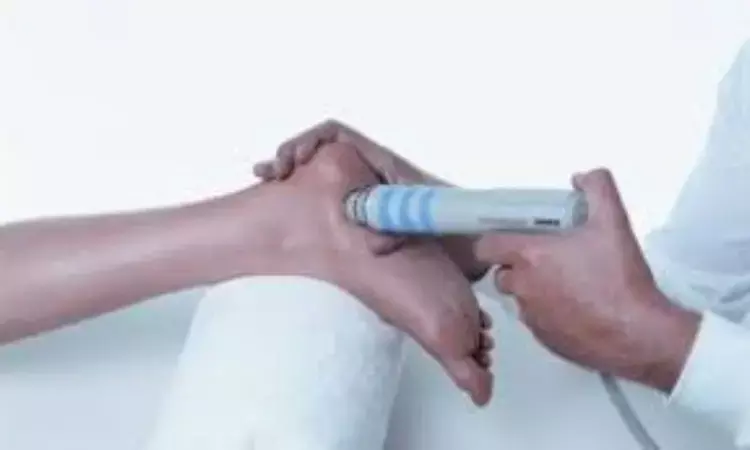- Home
- Medical news & Guidelines
- Anesthesiology
- Cardiology and CTVS
- Critical Care
- Dentistry
- Dermatology
- Diabetes and Endocrinology
- ENT
- Gastroenterology
- Medicine
- Nephrology
- Neurology
- Obstretics-Gynaecology
- Oncology
- Ophthalmology
- Orthopaedics
- Pediatrics-Neonatology
- Psychiatry
- Pulmonology
- Radiology
- Surgery
- Urology
- Laboratory Medicine
- Diet
- Nursing
- Paramedical
- Physiotherapy
- Health news
- Fact Check
- Bone Health Fact Check
- Brain Health Fact Check
- Cancer Related Fact Check
- Child Care Fact Check
- Dental and oral health fact check
- Diabetes and metabolic health fact check
- Diet and Nutrition Fact Check
- Eye and ENT Care Fact Check
- Fitness fact check
- Gut health fact check
- Heart health fact check
- Kidney health fact check
- Medical education fact check
- Men's health fact check
- Respiratory fact check
- Skin and hair care fact check
- Vaccine and Immunization fact check
- Women's health fact check
- AYUSH
- State News
- Andaman and Nicobar Islands
- Andhra Pradesh
- Arunachal Pradesh
- Assam
- Bihar
- Chandigarh
- Chattisgarh
- Dadra and Nagar Haveli
- Daman and Diu
- Delhi
- Goa
- Gujarat
- Haryana
- Himachal Pradesh
- Jammu & Kashmir
- Jharkhand
- Karnataka
- Kerala
- Ladakh
- Lakshadweep
- Madhya Pradesh
- Maharashtra
- Manipur
- Meghalaya
- Mizoram
- Nagaland
- Odisha
- Puducherry
- Punjab
- Rajasthan
- Sikkim
- Tamil Nadu
- Telangana
- Tripura
- Uttar Pradesh
- Uttrakhand
- West Bengal
- Medical Education
- Industry
Extracorporeal shockwave therapy improves quality of life in patients with claudication: JAMA

UK: A randomized clinical trial has shown that extracorporeal shockwave therapy (ESWT) may be considered a safe and effective alternative therapy for patients with intermittent lower limb claudication. Also, there were comparable improvements in quality of life to supervised exercise.
The study, published in JAMA Surgery comprising 138 patients, revealed that patients receiving ESWT had statistically higher quality of life measures than patients receiving a placebo.
An estimated 237 million people worldwide are affected with lower limb peripheral arterial disease (PAD), due to population aging this number is expected to rise. Intermittent claudication is the most common symptomatic manifestation of PAD and limits walking distances, physical function, and quality of life.
Current first-line recommendations for intermittent claudication management consist of smoking cessation, supervised exercise, cardiovascular risk reduction, and best medical therapy. Supervised exercise programs are not readily available, and a noninvasive alternative is required. Considering this, Paris Cai, Hull York Medical School, Hull, United Kingdom, and colleagues aimed to assess extracorporeal corporeal shockwave therapy in improving the quality of life in patients with claudication.
For this purpose, the researchers conducted a double-blind, placebo-controlled randomized clinical trial, including patients in the outpatient setting at a single tertiary center for vascular surgery. They were randomized in a ratio of 1:1 to ESWT or placebo therapy with no shockwaves delivered.
Patients were recruited between 2015 and 2020, with a 12-week follow-up ending in March 2020. A convenience sample of patients with claudication and conservative treatment requirements who were unable or refused to participate in supervised exercise were eligible. Patients with active cancer or receiving anticoagulation therapy were excluded.
Of 522 patients screened, 389 were eligible, 138 were enrolled, and 110 completed follow-up and were included in the primary analysis. Of 138 patients recruited and randomized, 67% were male, and the mean age of the study population was 67 years.
In the intervention group, patients received 100 impulses of 0.1mJ/mm/cm2 in an area of the gastrocnemius muscle three times weekly for 3 weeks. For the control group, the steps for treatment were replicated without delivering the treatment.
The study's primary outcome was the Physical Functioning domain of the 36-item Short-Form Quality of Life Questionnaire at the follow-up of 12 weeks. Secondary outcomes were ankle brachial pressure index, walking distances, and other quality-of-life measures.
The study led to the following findings:
- The intervention group had a significantly higher physical function score at 12 weeks (estimated median difference 3.8). However, this significance did not remain when adjusting for covariates.
- At 12 weeks, the intervention group had significantly longer pain-free and maximum walking distances (pain-free estimated median difference, 34.1; maximum estimated median difference, 51.4).
"To our knowledge, this is the first double-blind, placebo-controlled, randomized clinical trial to consider extracorporeal shockwave therapy for intermittent claudication management," the researchers wrote.
"It demonstrated efficacy for walking distances, may positively impact the quality of life, and may provide a safe, non-invasive alternative therapy for intermittent claudication patients."
Reference:
Cai P, Pymer S, Ibeggazene S, et al. Extracorporeal Shockwave for Intermittent Claudication and Quality of Life: A Randomized Clinical Trial. JAMA Surg. Published online April 10, 2024. doi:10.1001/jamasurg.2024.0625
Dr Kamal Kant Kohli-MBBS, DTCD- a chest specialist with more than 30 years of practice and a flair for writing clinical articles, Dr Kamal Kant Kohli joined Medical Dialogues as a Chief Editor of Medical News. Besides writing articles, as an editor, he proofreads and verifies all the medical content published on Medical Dialogues including those coming from journals, studies,medical conferences,guidelines etc. Email: drkohli@medicaldialogues.in. Contact no. 011-43720751


